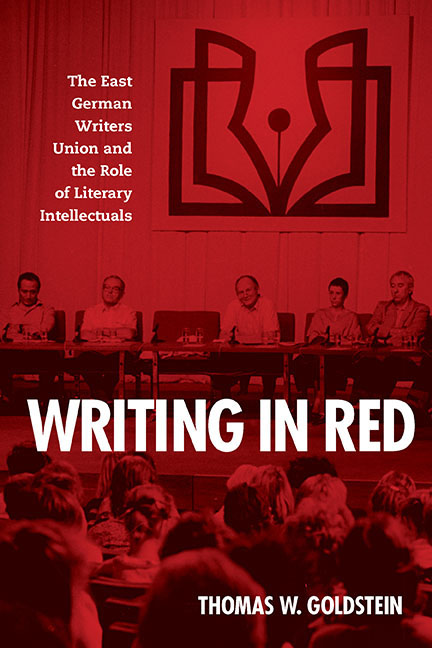Book contents
- Frontmatter
- Contents
- Acknowledgments
- List of Abbreviations
- Introduction
- 1 German Writers Associations through 1970
- 2 Socioeconomic Functions
- 3 The Era of No Taboos? 1971–76
- 4 A Disciplining Instrument, 1976–79
- 5 Defending Peace, Defining Participation, 1979–83
- 6 Years of Resignation, 1983–85
- 7 Glasnost in the GDR? 1985–89
- 8 Coming Full Circle, 1989–90
- Conclusion
- Notes
- Bibliography
- Index
2 - Socioeconomic Functions
Published online by Cambridge University Press: 24 August 2019
- Frontmatter
- Contents
- Acknowledgments
- List of Abbreviations
- Introduction
- 1 German Writers Associations through 1970
- 2 Socioeconomic Functions
- 3 The Era of No Taboos? 1971–76
- 4 A Disciplining Instrument, 1976–79
- 5 Defending Peace, Defining Participation, 1979–83
- 6 Years of Resignation, 1983–85
- 7 Glasnost in the GDR? 1985–89
- 8 Coming Full Circle, 1989–90
- Conclusion
- Notes
- Bibliography
- Index
Summary
WILHELM KRIEGER HAD A PROBLEM. Not even thirty years old, he had joined the Writers Union in December 1981 and now, less than a month later, needed help. Writing to Hermann Kant, he explained that his fiancée, a Bulgarian national, was pregnant, but Bulgarian authorities had not yet approved their marriage license. To make matters worse, the Bulgarian consulate in East Germany had refused to extend her residency permit. “Obviously,” he concluded, “I know that the association cannot solve such a problem. But in case you, with your commanding view, can offer a suggestion, I gladly ask for it.” Kant was no miracle worker, yet his “view” must have revealed an unforeseen option, for five months letter a fresh letter arrived from Krieger announcing the consulate had granted a five-year extension on his fiancée's visa. “I want to thank you very warmly,” he expressed, “for your efforts that possibly led to this outcome.”
It is unclear what role Kant played in this affair, though it was not outside the realm of possibility for him to pull strings to help a member. What is striking is that Krieger did not think it outlandish to ask the head of his professional union to intercede in a matter having nothing to do with literature. For decades GDR denizens cultivated techniques to attain things in a society plagued by shortages. Whether relying on substitutes, using knowledge of official rules, sending petitions, exploiting connections to the powerful, drawing on formal and informal networks, or utilizing black and “gray” markets, East Germans were to a remarkable degree able to overcome many—though certainly not all—obstacles as consumers and citizens. It is thus natural that writers would see their union as a vehicle to do the same. In fact, such requests were expected, and in many cases SV officials tried to help. They might not be able to move mountains, but an institution with strong ties to the state could make a difference in a bureaucratic dictatorship.
The major function of the SV was political, but the union also served a socioeconomic role for members, illustrating Konrad Jarausch's idea of the GDR as a “welfare dictatorship.” As part of the bargain by authors to not challenge the legitimacy of the dictatorship, the union provided members with benefits.
- Type
- Chapter
- Information
- Writing in RedThe East German Writers Union and the Role of Literary Intellectuals, pp. 42 - 68Publisher: Boydell & BrewerPrint publication year: 2017

